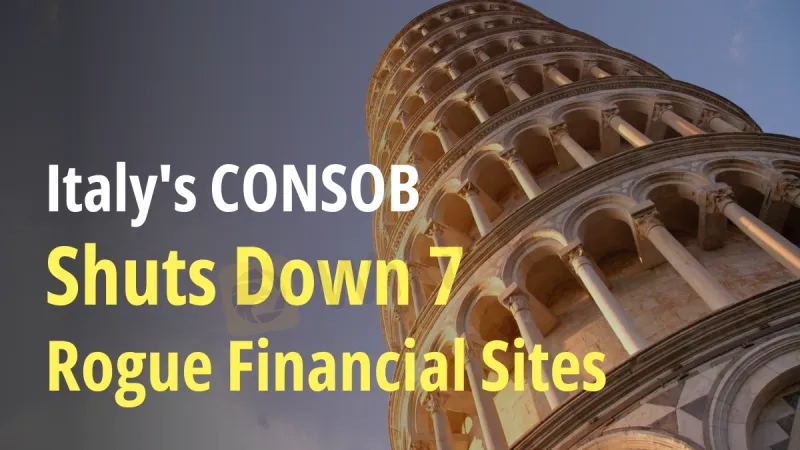简体中文
繁體中文
English
Pусский
日本語
ภาษาไทย
Tiếng Việt
Bahasa Indonesia
Español
हिन्दी
Filippiiniläinen
Français
Deutsch
Português
Türkçe
한국어
العربية
Italy's CONSOB Shuts Down 7 Rogue Financial Sites
Abstract:CONSOB intensifies the crackdown on unauthorized financial websites, permanently blocking seven more, signaling its ongoing commitment to investor protection.

The Italian Companies and Exchange Commission (CONSOB) has launched a forceful campaign against illicit financial operations by forcing the closure of seven more websites that provide financial services without the required permission. Since July 2019, 1060 websites have been prohibited as part of a more comprehensive and strict regulatory effort. This action took place on April 12, 2024. CONSOB is protecting investors and Italy's financial markets with its measures.
Newly blacklisted websites were acting in ways that jeopardized investor funds. These sites, which comprised organizations with names like “GMT,” “Capitalpartners24,” “FP Invest,” “Smart Limited Group,” and “Stockcptls,” were operating outside of the required legal framework and in violation of Italian financial laws. The “GMT” group alone owned multiple domains, including www.gmtdirect.com, www.gmtplatform.com, and www.gmtcapitals.com, as well as other linked client sites.
The CONSOB operation teaches investors to be vigilant, especially in the digital age when financial fraud has become more complex. CONSOB wishes to prevent any illicit services from misleading or harming investors, hence, it is shutting down these websites.

CONSOB has reminded all investors of the importance of doing due diligence as part of its public duty. Before using any online financial services, people should make sure the company has the appropriate licensing and that any investment proposals come with an official prospectus. Taking these measures is essential to guaranteeing that their investments are safe and that they are interacting with legitimate and respectable organizations.
About Consob
The Italian Companies and Exchange Commission (CONSOB), which regulates the securities market, oversees this industry. This includes protecting investors and maintaining openness by publicly listed corporations and market players. CONSOB was created in 1974 to improve Italian financial markets (growth, efficiency, and effectiveness).
CONSOB continuously works to regulate the digital financial frontier, which promotes a secure investing environment. In addition to preventing possible financial crime, every action taken against unapproved websites strengthens the regulatory framework required for the smooth operation of Italy's financial markets.
A shifting landscape of potential financial risks coexists with advancements in financial technology and service delivery. Consistent enforcement activities by CONSOB are essential in adapting to these changes and guaranteeing the stability and safety of Italy's financial market for all participants. CONSOB demonstrates its continued dedication to protecting investors and upholding the integrity of the Italian financial system by taking such measures.

Disclaimer:
The views in this article only represent the author's personal views, and do not constitute investment advice on this platform. This platform does not guarantee the accuracy, completeness and timeliness of the information in the article, and will not be liable for any loss caused by the use of or reliance on the information in the article.
Related broker
Read more

YouTube Creators Sue PayPal Over Honey’s Affiliate Tool
YouTube creators sue PayPal over the Honey browser tool, alleging redirected affiliate commissions. The case highlights affiliate fraud and its impacts on the creator economy.

OPEC's Profound Influence on the Oil Market
At present, oil prices remain relatively stable, but global economic recovery and shifting market demands continue to drive price fluctuations. Amid an uncertain global economic and geopolitical landscape, OPEC’s policies and actions remain key determinants of oil prices.

What Are The Top 5 Cryptocurrency Predictions For 2025?
Discover the top 5 cryptocurrency predictions for 2025, including Ethereum's rise, a potential bear market, meme coin struggles, and regulatory shifts.

Think Before You Click: Malaysian Loses RM240,000 to Investment Scam
A manager from Sibu, Malaysia, lost RM240,000 to a fraudulent investment scheme.
WikiFX Broker
Latest News
PH SEC Issues Crypto Guidelines for Crypto-Asset Service Providers
FTX Chapter 11 Restructuring Plan Activated: $16 Billion to Be Distributed
Think Before You Click: Malaysian Loses RM240,000 to Investment Scam
Share Industry Insights and Discuss Forex Market Trends
Top 9 Financial Fraud Cases in Recent History
KuCoin Pay Introduces Easy Crypto Payments for Merchants
Malaysian Man Killed in Alleged Forex Dispute-Related Attack
How Big is the Impact of the USD-JPY Rate Gap on the Yen?
What Euro Investors Can't Afford to Miss
Is OneRoyal the Right Broker for You?
Currency Calculator






